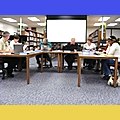- By Dan Veaner
- News
 Print
Print  The Lansing Board Of Education approved a $26,536,000 budget Monday for the 2013-2014 school year. That will mean an estimated tax rise of $317, a 4.26 tax rate rise, this summer for homes valued at $200,000. While the board was unanimous on the budget as a whole, it was split on the way the money should be raised.
The Lansing Board Of Education approved a $26,536,000 budget Monday for the 2013-2014 school year. That will mean an estimated tax rise of $317, a 4.26 tax rate rise, this summer for homes valued at $200,000. While the board was unanimous on the budget as a whole, it was split on the way the money should be raised.The board is required to vote on the budget amount, but where the money comes from is determined when the tax warrent is issued in late summer. But board members agreed to give Business Administrator Mary June King guidance on how to break down revenue so she can present the information to taxpayers in the budget bulletin.
"The public is going to want to know where we stand when we're recommending a tax increase," said board member Tom Robinson.
The district can raise the levy by an amount that would raise the tax rate to a maximum of 5.18% to meet the so-called 2% tax cap. That means that 50% of voters can approve up to that amount more than last year. King noted that if the board chooses to raise the levy higher than that, a 60% majority would be needed. None of the options she presented exceeded that amount.
King noted that impacts on revenue include the Cayuga Power Plant's valuation, and huge increases in employee benefit costs. She said that unfunded state mandates requiring reporting are costing the district more each year.
"We've had to hire more and more services from BOCES related to data analysis and inputting," she said. "We're spending at least a half million dollars in excess of what we used to spend related to the data coordination of these new requirements."
King presented the board with three ways to fund the budget. While the $26.5 million budget remains the same in all three scenarios, the amount taxpayers have to pay does not. Some revenue streams remain the same including state and federal aid. But the amount raised from PILOTs, reserves, and taxpayers varies. Most significantly, the more reserves are applied to the budget, the lower the tax rate can be.
But, like a checking account, once the reserves are used, they're gone. In one projection King estimated that reserves will be entirely depleted in three years. That estimate predicts an 11.78 tax rate increase even with almost a million dollars in reserve monies applied to that budget. The following year the cupboard would be bare.
"Our concern is that we have reached the point of finding those efficiencies, and in four years we'll be making a $2 million cut in our program, in what we offer," said Superintendent Chris Pettograsso. "That is something that we can not continue to put off."
Board President David Dittman and members Glenn Swanson, Tom Robinson, and Christine Iacobucci voted to recommend a middle course that will result in an estimated 4.26% (additional $317 for a $200,000 home). Aziza Benson said she favored a 3.99% tax rate raise option ($306), and Julie Boles favored a 5.18% tax rate increase ($354).
The 4.26% tax rate rise is only a recommendation at this point. King noted that in past years the expected tax rate was higher than the actual one as various issues impact revenue projections over the summer.
"In four of the five years I've been here, when it comes time to go out for the warrant, you've reduced the tax rate," King said. "The assessment has come in higher, or we've gotten better information on state aid or other items on the revenue side."
v9i14



